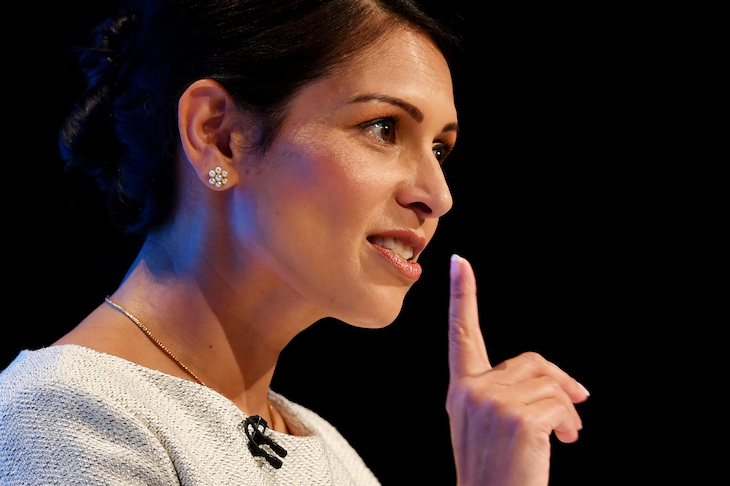Once you accept that Brexit is happening – because, like it or not, the British people demanded it – it is not so very hard to accept that Brexit must come with consequences. In the absence of free movement from the European Union to the United Kingdom, new immigration arrangements must be put in place. As a political matter – which should not be confused with the policy design or practical application of new immigration controls – these must be seen to be tougher than the regime which preceded it. That is the meaning of ‘Take Back Control’.
So it is no great surprise that the measures announced today represent, on the surface, a toughening of immigration rules. A low moment, you may feel, and I am inclined to agree. But in a political sense, the government will be satisfied with the reaction the new regulations have provoked. The more its opponents complain, the happier ministers and their aides will be. There is no better way of signalling victory to your own supporters than by pointing to the lamentation of your foes. This is the point of Priti Patel. If proposals for an ostensibly-onerous ‘points-based’ system provoked no reaction, how would the government’s supporters know they’d triumphed?
And the new rules are, of course, more onerous than those they replace even if would-be immigrants from outwith the EU might observe that the previous regime was rather less generous than popularly imagined. Still, you can scarcely move on Twitter today without coming across people complaining that they – or their parents or grandparents – would not be eligible to come and live and work in the UK had these arrangements been in place back in the day. Again, as far as the government is concerned: job done, signal sent.
The more its opponents complain, the happier ministers and their aides will be. There is no better way of signalling victory to your own supporters than by pointing to the lamentation of your foes
Because when you peer beneath the bonnet, you discover that these regulations are really, in the end, not much more than a fine example of the government’s own brand of ‘virtue signalling’. A means by which it may parade the appearance of ‘toughness’ while designing an immigration system that will – I bet you – eventually prove significantly less ‘tough’ in practice than it is in theory.
Leaving the EU naturally makes immigration a more bureaucratic matter than it was previously and, this being a Home Office matter, we should expect the new system to be even more thoroughly filled with injustice, inhumanity, and general spitefulness than its predecessor. But, whether we like it or not (and I do not) this is not something which displeases the general public.
For one of Brexit’s ironies is that Brexit, which was in no small measure predicated upon concerns about immigration (sometimes, indeed often, disgracefully so), has by its mere application dramatically reduced the salience of immigration as a matter of widespread political concern. The idea that things might change and the possibility of changing them without reference to anyone else is actually sufficient to draw the sting from immigration as a subject of public interest. Something similar, I warrant, will be seen with the fishing industry: the ability to introduce changes is more salient, more important, than the detail of those changes themselves.
In the case of immigration, this leads to a particular paradox: it may well be that the only way to have a decent and liberal immigration policy is if the public happens to think it is a beastly one. Only then do you reduce public concern; only then can you work around public opinion rather than against it.
And there will – again, I bet you – be some working around. The suggestion that tighter immigration controls will persuade employers to invest in new technology or other productivity-raising measures might hold good in some sectors but it is plainly a nonsense in many of the sectors that, at present, rely upon non-UK citizens for a hefty chunk of their labour force. There is a limit to what technology can do in agriculture and hospitality and a still greater limit to what it can achieve in social care.
At some point, and likely sooner rather than later, something will have to give. As and when that becomes a choice between foreigners working in nursing homes and British pensioners failing to receive the care they require it is not easy to guess which of those will have to give. Doubtless the Home Secretary means what she says but she’s not quite alert enough to know the eventual meaning of what she says.
None of this, again, is as simple as freedom of movement within the EU and all of it will impose additional costs on business – and, eventually, consumers – but such are the wages of Take Back Control. Equally, if you accept the argument about Britain’s post-2008 ‘jobs miracle’ – and I believe the government would like you to accept that – then it seems palpably obvious that many of those jobs newly deemed ‘unskilled’ will soon be reclassified as ‘skilled’ the better to allow British business access to the labour is currently requires and will still need in the years to come.
All of which makes for a complicated and often unseemly way of ensuring rather less actually changes than is heralded by the headline announcements. Once again, Brexit is a boon for workarounds just as much as it is a catalyst for actually doing things significantly differently. And, as always in politics, appearances are just as vital as reality.







Comments